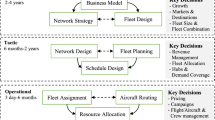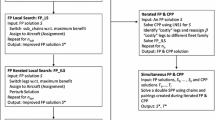Abstract
The airline’s ability to offer flight schedules that provide service to passengers at desired times in competitive markets, while matching demand with an aircraft fleet of suitable size and composition, can significantly impact its profits. In this spirit, optional flight legs can be considered to construct a profitable schedule by optimally selecting among such alternatives in concert with assigning the available aircraft fleet to all the scheduled legs. Examining itinerary-based demands as well as multiple fare-classes can effectively capture network effects and realistic demand patterns. In addition, allowing flexibility on the departure times of scheduled flight legs can increase connection opportunities for passengers, hence yielding robust schedules while saving fleet assignment costs within the framework of an integrated model. Airlines can also capture an adequate market share by balancing flight schedules throughout the day, and recapture considerations can contribute to more realistic accepted demand realizations. We therefore propose in this paper a model that integrates the schedule design and fleet assignment processes while considering flexible flight times, schedule balance, and recapture issues, along with optional legs, path/itinerary-based demands, and multiple fare-classes. A polyhedral analysis is conducted to generate several classes of valid inequalities, which are used along with suitable separation routines to tighten the model representation. Solution approaches are designed by applying Benders decomposition method to the resulting tightened model, and computational results are presented using real data obtained from United Airlines to demonstrate the efficacy of the proposed procedures.
Similar content being viewed by others
References
Abara, J. (1989). Applying integer programming to the fleet assignment problem. Interfaces, 19(4), 20–28.
Andreas, A. K., & Smith, J. C. (2009). Decomposition algorithms for the design of a nonsimultaneous capacitated evacuation tree network. Networks, 53(2), 91–103.
Barnhart, C., Boland, N. L., Clarke, L. W., Johnson, E. L., Nemhauser, G. L., & Shenoi, R. G. (1998). Flight string models for aircraft fleeting and routing. Transportation Science, 32(3), 208–220.
Barnhart, C., Kniker, T., & Lohatepanont, M. (2002). Itinerary-based airline fleet assignment. Transportation Science, 36(2), 199–217.
Benders, J. F. (1962). Partitioning procedures for solving mixed-variables programming problems. Numerische Mathematik, 4, 238–252.
Berge, M. E., & Hopperstad, C. A. (1993). Demand driven dispatch: a method for dynamic aircraft capacity assignment, models and algorithms. Operations Research, 41(1), 153–168.
Clarke, L. W., Hane, C. A., Johnson, E. L., & Nemhauser, G. L. (1996). Maintenance and crew considerations in fleet assignment. Transportation Science, 30(3), 249–260.
Cordeau, J. F., Soumis, F., & Desrosiers, J. (2000). A benders decomposition approach for the locomotive and car assignment problem. Transportation Science, 34(2), 133–149.
Cordeau, J. F., Stojkovic, G., Soumis, F., & Desrosiers, J. (2001). Benders decomposition for simultaneous aircraft routing and crew scheduling. Transportation Science, 35(4), 375–388.
Cordeau, J. F., Pasin, F., & Solomon, M. M. (2006). An integrated model for logistics network design. Annals of Operation Research, 144(1), 59–82.
Cote, G., & Laughton, M. A. (1984). Large-scale mixed integer programming: benders-type heuristics. European Journal of Operational Research, 16, 327–333.
Desaulniers, G., Desrosiers, J., Dumas, Y., Solomon, M., & Soumis, F. (1997). Daily aircraft routing and scheduling. Management Science, 43(6), 841–855.
Fischetti, M., & Lodi, A. (2003). Local branching. Mathematical Programming, 98(1–3), 23–47.
Fischetti, M., Salvagnin, D., & Zanette, A. (2010). A note on the selection of benders’ cuts. Mathematical Programming B, 124, 175–182.
Geoffrion, A. M., & Graves, G. W. (1974). Multicommodity distribution system design by benders decomposition. Management Science, 20(5), 822–844.
Hane, C. A., Barnhart, C., Johnson, E. L., Marsten, R. E., Nemhauser, G. L., & Sigismondi, G. (1995). The fleet assignment problem: solving a large-scale integer program. Mathematical Programming, 70(2), 211–232.
Haouari, M., Sherali, H. D., Mansour, F. Z., & Aissaoui, N. (2010). Exact approaches for integrated aircraft fleeting and routing. Computational Optimization and Applications. doi:10.1007/s10589-009-9292-z.
Jacobs, T. L., Johnson, E. L., & Smith, B. C. (1999). O&D FAM: incorporating passenger flow into the fleeting process. In R. Darrow (Ed.), Thirty-ninth annual AGIFORS symposium, New Orleans, LA (pp. 128–161).
Jiang, H., & Barnhart, C. (2009). Dynamic airline scheduling. Transportation Science, 43(3), 336–354.
Kniker, T. (1998). Itinerary-based airline fleet assignment. Ph.D. Dissertation, Massachusetts Institute of Technology, Cambridge, MA.
Lan, S., Clarke, J.-P., & Barnhart, C. (2006). Planning for robust airline operations: optimizing aircraft routing and flight departure times to minimize passenger disruptions. Transportation Science, 40(1), 15–28.
Lohatepanont, M., & Barnhart, C. (2004). Airline schedule planning: integrated models and algorithms for schedule design and fleet assignment. Transportation Science, 38(1), 19–32.
Magnanti, T. L., & Wong, R. T. (1981). Accelerating benders decomposition: algorithmic enhancement and model selection criteria. Operations Research, 29, 464–484.
McDaniel, D., & Devine, M. (1977). A modified benders partitioning algorithm for mixed integer programming. Management Science, 24(3), 312–319.
Mercier, A., Cordeau, J. F., & Soumis, F. (2005). A computational study of benders decomposition for the integrated aircraft routing and crew scheduling problem. Computers & Operations Research, 32(6), 1451–1476.
Papadakos, N. (2009). Integrated airline scheduling. Computers & Operations Research, 36(1), 176–195.
Rei, W., Cordeau, J.-F., Gendreau, M., & Soriano, P. (2009). Accelerating benders decomposition by local branching. INFORMS Journal on Computing, 21(2), 333–345.
Rexing, B., Barnhart, C., Kniker, T. S., Jarrah, T. A., & Krishnamurthy, N. (2000). Airline fleet assignment with time windows. Transportation Science, 34, 1–20.
Rushmeier, R. A., & Kontogiorgis, S. A. (1997). Advances in the optimization of airline fleet assignment. Transportation Science, 31(2), 159–169.
Saharidis, G. K. D., & Ierapetritou, M. G. (2009). Scheduling of loading and unloading of crude oil in a refinery with optimal mixture preparation. Industrial & Engineering Chemistry Research, 48(5), 2624–2633.
Saharidis, G. K. D., & Ierapetritou, M. G. (2010). Improving benders decomposition using maximum feasible subsystem (MFS) cut generation strategy. Computers & Chemical Engineering, 34, 1237–1245.
Saharidis, G. K. D., Minoux, M., & Dallery, Y. (2009). Scheduling of loading and unloading of crude oil in a refinery using event-based discrete time formulation. Computers & Chemical Engineering, 33(8), 1413–1426.
Saharidis, G. K. D., Minoux, M., & Ierapetritou, M. G. (2010). Accelerating benders method using covering cut bundle generation. International Transactions in Operational Research, 17(2), 221–237.
Saharidis, G. K. D., Boile, M., & Theofanis, S. (2011). Initialization of the benders master problem using valid inequalities applied to fixed-charge network problems. Expert Systems With Applications, 38, 6627–6636.
Sandhu, R., & Klabjan, D. (2007). Integrated airline fleeting and crew-pairing decisions. Operations Research, 55(3), 439–456.
Sherali, H. D., & Adams, W. P. (1990). A hierarchy of relaxations between the continuous and convex hull representations for zero-one programming problems. SIAM Journal on Discrete Mathematics, 3(3), 411–430.
Sherali, H. D., & Adams, W. P. (1994). A hierarchy of relaxations and convex hull characterizations for mixed-integer zero-one programming problems. Discrete Applied Mathematics, 52, 83–106.
Sherali, H. D., & Lunday, B. (2010). On generating nondominated benders cuts. Manuscript, Grado Department of Industrial and Systems Engineering, Virginia Polytechnic Institute and State University, Blacksburg, VA.
Sherali, H. D., & Zhu, X. (2008). Two-stage fleet assignment model considering stochastic passenger demands. Operations Research, 56(2), 383–399.
Sherali, H. D., Bish, E. K., & Zhu, X. (2005). Polyhedral analysis and algorithms for a demand driven refleeting model for aircraft assignment. Transportation Science, 39(3), 349–366.
Sherali, H. D., Bish, E. K., & Zhu, X. (2006). Airline fleet assignment concepts, models, and algorithms. European Journal of Operational Research, 172(1), 1–30.
Sherali, H. D., Bae, K.-H., & Haouari, M. (2009). Integrated airline schedule design and fleet assignment: polyhedral analysis and benders decomposition approach. INFORMS Journal on Computing. doi:10.1287/ijoc.1090.0368 (Articles in advance. http://joc.journal.informs.org/cgi/content/abstract/ijoc.1090.0368v1, pp. 1–14).
Author information
Authors and Affiliations
Corresponding author
Rights and permissions
About this article
Cite this article
Sherali, H.D., Bae, KH. & Haouari, M. A benders decomposition approach for an integrated airline schedule design and fleet assignment problem with flight retiming, schedule balance, and demand recapture. Ann Oper Res 210, 213–244 (2013). https://doi.org/10.1007/s10479-011-0906-3
Published:
Issue Date:
DOI: https://doi.org/10.1007/s10479-011-0906-3




